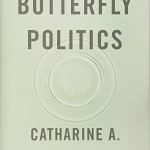Although Mackinnon’s writing is centered almost entirely in the US, her understanding of concepts of power, privilege and intellectual freedom isn’t just universal, but also prophetic.
The title of Catharine Mackinnon’s book ‘Butterfly Politics’ , borrows from the idea of ‘chaos theory’. The book defines this theory by how ‘the minuscule motion of a butterfly’s wings can trigger a tornado half a world away’ . Underlying this theory is the belief that even simple, minute actions can result in magnified, complex outcomes if the conditions are right.
The book spans a compilation of decades’ worth of Mackinnon’s life as a feminist activist, academic and lawyer, including previously unpublished speeches and writings.
Mackinnon’s writing is centered almost entirely in the US, limiting the focus to a North American legal system. Yet her theoretical understanding of concepts of power, privilege and intellectual freedom isn’t just universal, but also prophetic in the ways it holds
weight in 2018, our time and space. The chapter ‘On Academic Freedom: From Powerlessness to Power’ first featured as a speech in 2002, wherein she laments the fact that this issue is still a subject of discussion. It is stunning to note how little has changed
even now in 2018, when multiple columnists from The Atlantic to New York Times have been warning of an alleged influx of campus censorship, ‘coddled’ students , and questioning student activism as ‘ oversensitive ’. Today, student groups such as the
pro-Palestine student movement for Boycott, Divestment and Sanctions (BDS) against Israel are gaining momentum across North American and British higher education institutes. In 2016, when University of Chicago’s dean of undergraduate students told the incoming class not to expect ‘safe spaces’ and ‘trigger warnings’, a fresh series of debates arose across media and academic platforms. Both in the US, and closer home as well – the issue of boycotts or ‘no platforming’ controversial speakers has often sparked furious discussions on the idea of academic freedom.
Mackinnon’s text touches upon these issues, as she differentiates between academic freedom versus intellectual freedom. She contends that academic freedom went from being invoked against power, to now working for the powerful instead. Her scholarship illuminates how ‘free speech’ has always been the domain of the privileged: white, cisgendered, dominant caste, upper class, heterosexual and male social identities.
One of the initial chapters, ‘A Radical Act of Hope’ , is equally prescient. Though the speech was originally delivered in 1989 as part of Yale Law School’s Strike for Faculty Diversity, her insight on ‘merit’ could as well be relevant to the Brahminism reeking in
India’s academia even today. By unpacking the hollowness of connotations behind the term, she reminds the reader how meritocracy is a function of privileged social identities and unfairly inherited socio-economic capital. Mackinnon duly pinpoints the failure of
ensuring just and proportionate representation for people of color, women, disabled, Muslim, and trans-people in the US, as well as the Dalit, Bahujan and Adivasi subaltern closer home sans whataboutery. ‘Implicit in all these evasions is seeing things from the
point of view of power and not being able to see anything else’ , she stresses, as she enlists the excuses most cited for not having a diverse faculty. This chapter alone makes this book worth a read.
Mackinnon’s scholarship on prostitution and pornography has been duly critiqued by many who find that her views in this domain fail to accord agency to women. The book features her testimony to the Attorney General’s Commission on Pornography (May, 1985), wherein she highlighted how pornography ‘sexualizes women’s inequality’. Along with radical feminist scholar Andrea Dworkin, the two worked together to forge resistance to the pornography industry in the legal realm. By working on local antipornography ordinances in the U.S., their work was accused of threatening free speech. Even as Mackinnon categorically denied these allegations, there were also claims that her stance on pornography put her in the same ideological framework as the moralist Right who opposed prostitution and pornography on conservative grounds. The text offers a critical perspective into sex-work and porn through the foregrounding of ‘consent’ as a metric. To Mackinnon, this is too low a bar, as she elucidates how ‘consent’ is in itself an intrinsically unequal concept, ‘a pathetic standard’.
As a reader, I would like to disclose my personal skepticism at the idea that “small simple actions can produce large complex effects”, which the book flap claims. The question that looms large in spite of the exhaustive body of work that Mackinnon has to offer, is whether feminists can even seek to make gains by changing the law. The fact remains that no amount of changes in the law can exist in a vacuum, when the fundamental nature of the State and society at large remains patriarchal, capitalist and heteronormative. The existing legal order is ultimately a reflection of our larger society and polity, and indeed, upholds the same. Reforming the law isn’t going to transform society and induce change by itself, it’s only the means to an end, not the end in itself. The Vishakha guidelines which were used to provide a framework against workplace sexual harassment emerged after years of work and activism by feminist groups, lawyers, and rape victim Bhanwari Devi’s own struggle for justice. Even today, despite the 2013 Sexual Harassment of Women at Workplace (Prevention, Prohibition and Redressal) Act, little has changed in terms of social reality – especially for Dalit Bahujan and working-class women pushed to the margins, like Bhanwari Devi herself.
Accordingly, Mackinnon herself seems skeptical of whether legal change is the end-goal for us as feminists to aspire to, a view cemented by her most recent commentary on how #MeToo as a movement achieved that which the law could not. ‘Sexual harassment law
prepared the ground, but it is today’s movement that is shifting gender hierarchy’s tectonic,’ she observes, echoing some of our apprehensions as readers of Butterfly Politics.
Nevertheless, for all the deeper questions left unanswered by the titular premise, the book offers a comprehensive understanding of Mackinnon’s legal scholarship through over four decades. Her work asks tough questions, and clearly set some theoretical precedents in our modern-day, Tumblr and ‘social justice warrior’ era understanding of sexism, power dynamics and inequality.

‘Butterfly Politics by Catharine A. Mackinnon’ has been published by Harvard University Press.




If someone thinks that “free speech has always been the domain of the privileged: white, cisgendered, dominant caste, upper class, heterosexual and male social identities.” Then they don’t deserve the right of free speech. This book sound like disgusting post modern dreck that deserves to be mocked and at minimum.